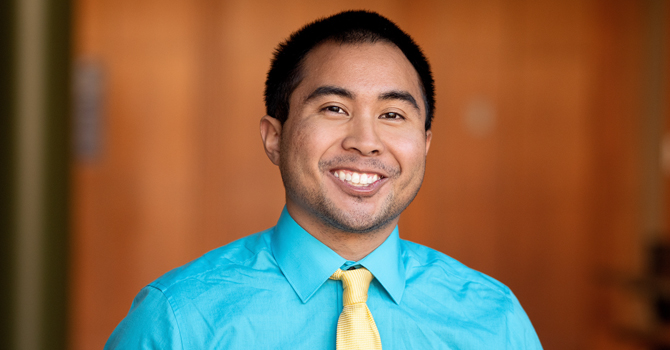For the Health of California’s Workers and Their Environments

Emilio Ronquillo
Master’s Student in Environmental Health Sciences, Chevron Scholar
I witnessed a good deal of worker strikes as a university student in California. One worker participating in recent strikes in California is a friend of mine—a night-shift janitor who befriended me while I came and went from my full-time research job.
This friend postponed retirement multiple times and had surgery to address work-related injuries. As an industrial hygienist, I hope I can improve the quality of life for workers like my friend.
The environments we experience at our places of work have a tremendous impact on our health. And this relationship between work and health is especially important in an American economy that demands long work hours from so many for so many years of their lives.
From the dynamic, dangerous operations of a refinery to hospitals that must evaluate and control infectious agents, industrial hygienists play a vital role in public health.
The field of industrial hygiene is a bridge between human workers and the risky environments many must navigate to earn a living. From the dynamic, dangerous operations of a refinery to hospitals that must evaluate and control infectious agents, industrial hygienists play a vital role in public health.
My journey to public health began as an environmental science undergraduate at UCLA, where I had the opportunity to work on groundwater quality with the Los Angeles Regional Water Quality Control Board. After graduation, I worked as a lab research associate in the UCLA human genetics department and volunteered with an aerosol research lab at the UCLA Fielding School of Public Health. We performed air sampling in e-cigarette stores and adjacent businesses to assess particle emissions of e-cigarettes and the potential for an effect similar to second-hand smoke.
In addition to the research itself, I learned a lot about communicating with and educating the general public about public health and how deeply we must consider the social and economic aspects of our research.
I chose Michigan because its industrial hygiene program has a storied history and is known for placing alums in top institutions throughout the world. I’m now learning from some of the best industrial hygiene teachers out there.
More about Emilio
Ronquillo is president of the University of Michigan Industrial Hygiene Students Association (UMIHSA), a student organization providing networking events, professional development classes, guest lectures, community service and charity opportunities, and social events for industrial hygiene students. He got involved with UMIHSA because he wanted to ensure every student has the chance to prepare themselves for the career most rewarding for them, no matter where they come from or how they got here. Putting on events has been especially challenging during the coronavirus pandemic, Ronquillo says. But he and fellow executive board members have been busy this summer and fall reaching out to prospective and incoming students to support their transition into the School of Public Health.My internship this summer was at the Marathon Petroleum Corporation oil refinery in Anacortes, Washington. My projects included assessing ventilation hoods throughout the refinery, monitoring worker exposure to chemicals and noise, creating area noise maps, and analyzing toxic gas data to inform the placement of monitors. I also learned how to operate and calibrate a variety of monitoring instruments and participated in an emergency oil spill practice drill.
I hope my work as an industrial hygienist will contribute to safety improvements that offer environmental protections not only for workers but also for their families and communities.
My experience at the refinery expanded on classroom tools and concepts by having me work independently in the face of deadlines and budgetary concerns. I interacted with a diverse population of workers and learned how to collaborate with people holding a variety of worldviews. Refinery staff with experience in engineering, operations, maintenance, and safety assisted me in gathering and interpreting data for my projects. Their support reinforced for me how interdisciplinary the field of industrial hygiene must be to function at its highest level and motivated me to continue developing my literacy in other disciplines throughout my education and career.
I grew up in California's East Bay Area, a region now affected by some of the state’s worst wildfires on record. In high school, I was interested in the natural sciences but thrived academically in the social sciences and in communication. The emphasis on climate science discourse in California began well before my high school years, and my awareness of that intensifying discourse inspired me to look at academic programs at the intersection of science and the humanities. I hope my work as an industrial hygienist will contribute to safety improvements that offer environmental protections not only for workers but also for their families and communities.
